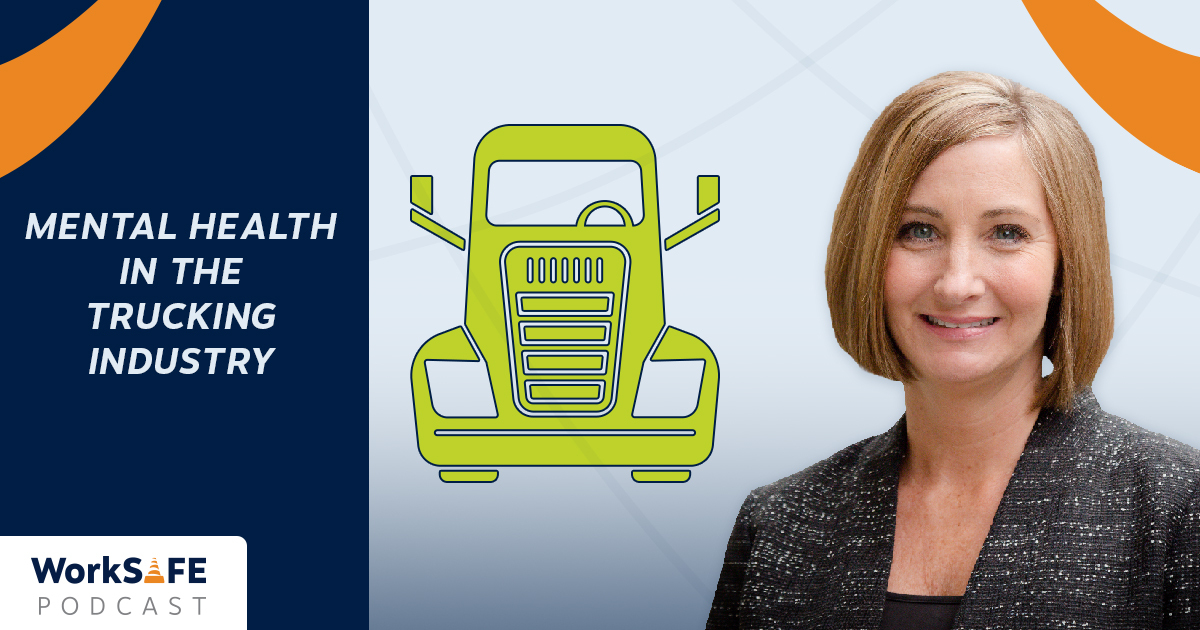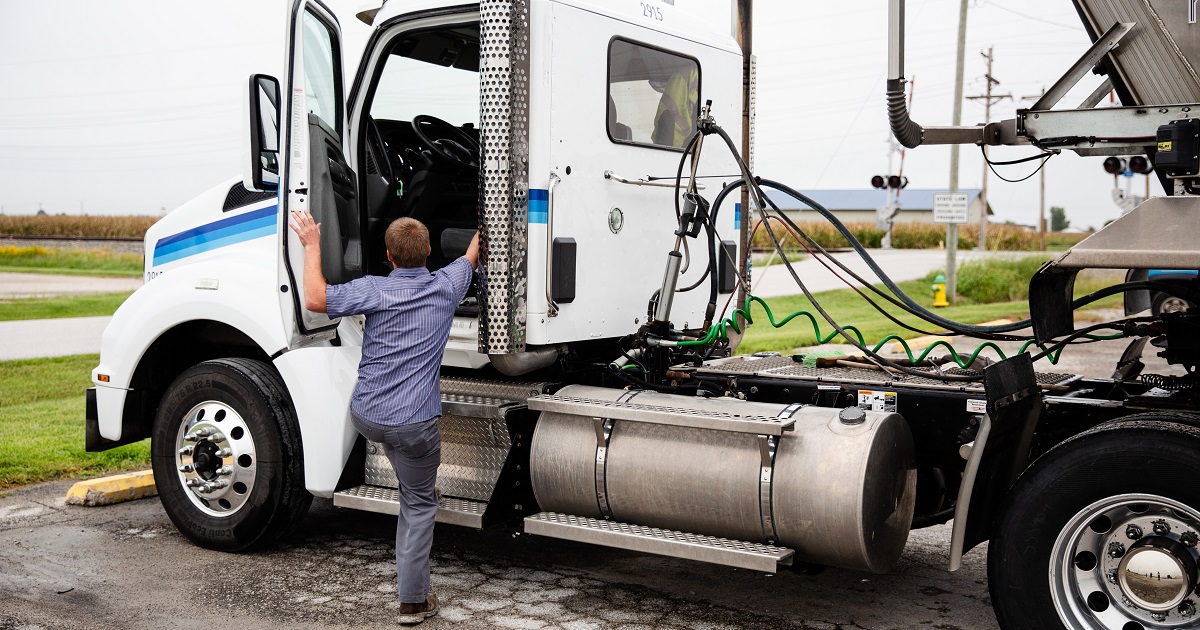For Media Inquiries
Contact Revee White, Director of Marketing and Communications at rwhite1@mem-ins.com or 573.499.4190.
It’s no secret that life has become more stressful for everyone over the past couple of years. Some industries have been affected more than others. Truck drivers fall into this category. There is more demand than ever for goods and groceries – and more pressure to get them to their destination sooner. According to the American Trucking Association, the U.S. needs about 80,000 more truck drivers than are actually in the workforce now. Any industry with a shortage of employees means more stress on those who currently work in it.
On this episode of the WorkSAFE Podcast, we sit down with Dr. Chuck Hollister. He is a licensed psychologist and clinical social worker. Dr. Hollister has more than 20 years of experience. He is the current Executive Director of the Missouri Psychological Association.
First, we’ll talk about common stressors in the trucking industry. Then, we’ll discuss why it’s so hard for drivers to seek help. Finally, we’ll share what trucking industry employers can do to support the mental health of their drivers.
Listen to this episode on the WorkSAFE Podcast, or read the show notes below.
Stress on the rise in the trucking industry
To Dr. Hollister, truck drivers are essential to the economy and well-being of the country. “The trucking industry moves over 700 billion dollars of goods on a daily basis,” he shared. “They deliver to roughly 55,000 pharmacies a day – deliver medical supplies – so that the rest of us can stay healthy. The fact is, our truckers really deserve our thanks. We owe them a debt of gratitude.”
Unfortunately, the trucking industry is one packed with stressors. Drivers have a very high level of responsibility. They often make decisions and use skills that save lives on the road. “According to the CDC, truckers experience higher rates of obesity, diabetes, anxiety, depression, cardiovascular disease, divorce, drug use and suicide,” he added. And the amount of strain they face in their day-to-day work is on the rise. It can be hard to gather data on this traveling employee population. Even so, Dr. Hollister estimates that nearly 20 percent of truckers are experiencing some sort of mental health issue.
Separation from support networks
On the road for days, or even weeks at a time, truck drivers face challenges both on and off the job. They are separated from support networks. Between 20 to 25 percent of truckers report that they have difficult family relationships. Even fewer get support from friends. “Social support is a major way that we stay healthy,” Dr. Hollister explained. Without it, drivers can feel isolated and lonely. They also worry about those they leave behind, and what they may be missing.
Adverse work experiences
Despite the important role drivers have in our economy, they aren’t always treated well. For example, drivers make constant deliveries to stores and warehouses. Anything from bad weather to heavy traffic can throw these deliveries behind. Shipping and receiving staff don’t always offer a warm welcome. The pressure of tight schedules falls on drivers – and so do the consequences of delays.
Constantly walking the wire
Drivers are on the road much longer than the average person. As a result, they encounter more negative experiences than the average driver would. “About 70 percent of truckers report trauma or loss issues,” Dr. Hollister said. This includes being in road accidents – or being a witness to them. On long hauls, they also worry about risk exposures unique to trucking, including:
- Chronic fatigue and sleep deprivation, including falling asleep at the wheel
- Poor road and weather conditions
- Roadside violence, including being robbed or attacked
This constant exposure to stress and trauma can be too much for some drivers. Drug use has emerged as a coping method. Suicide has also become a major issue in the industry. “There’s a tremendous problem in our country with that,” Dr. Hollister shared. “Suicide is rising. Truck drivers are the fifth highest group occupationally at-risk for suicide. And similar to police officers, where you you hear about suicide by cop, it’s not unusual for truckers to commit suicide by truck.”
The pressure on truckers has simply continued to build. “When you combine all of that together – lack of social support, the adverse work experiences, the trauma and loss, the sleep problems, the chronic fatigue, the negative coping…it’s a rough industry to to be successful in and to maintain your self-care.”
Barriers that keep truck drivers from seeking help
We have nearly 9,000 thoughts per day. Not all of them are good, positive or helpful to us. And in the isolation of a truck for long periods at a time, these thoughts have room to consume. While the stigma against seeking mental health help is slowly fading, it hasn’t completely gone away. For truck drivers, that mountain is even harder to climb.
The industry is dominated by men, and a macho atmosphere. Further, many lack the social support that makes people feel safe enough to share. “When you’re separated from social support a lot, you don’t get in the habit of of building those working relationships that that feel safe and supportive,” Dr. Hollister explained. “So when you start feeling overwhelmed, and you’re disconnected from social support, and you don’t have much experience with it to begin with, it can make it really really hard to reach out.”
Drivers need psychological support
Drivers run into traumatic situations. They experience car accidents, witness them and are often expected to keep moving through work as if nothing is wrong. But events like these can have a significant effect on a person. Dr. Hollister recalls an incident where a young driver hit the car he and his son were in. While the car was totaled, and fortunately no one was seriously injured, the impact of the event extended beyond that day. A near miss just a few weeks later caused him to experience a rush of panicked feelings, thinking about what could have happened – and what didn’t.
As a psychologist, Dr. Hollister had the tools to help put himself on the road to emotional recovery. But the average driver doesn’t have that. They aren’t taught how to cope. “Think of how many police shows you’ve watched, ” he offered as an example, “Where some police officer is in a traumatic situation, and his supervisor sends him off to be cleared by a psychologist.” The traumatic situations police officers and drivers encounter can be similar. However, only one is getting the mental health support he needs to get back to performing at 100 percent.
Depression has long-term consequences
Without support, mental health issues can affect both employees and their employers. Dr. Hollister points out that worldwide, depression is the number one cause of productivity problems. When people are depressed, they don’t function well. They also have a hard time doing their jobs well. Consequently, employers are financially impacted.
It’s important for employers to monitor the mental and physical health of their drivers. “We know that that the more depressed you are, the more likely you are to feel pain,” he explained. “The more you physically hurt, the more likely it is you’ll feel depression. It’s kind of a vicious cycle really, and so it’s important to make sure that your workers are being taken care of physically as well as mentally.”
How to take action and make a difference
For Dr. Hollister, mental health needs to be made a cultural issue in the trucking industry. Both employers and drivers have a role to play in improving conditions. “It needs to be a workplace issue,” Dr. Hollister recommends. “In other words, we shouldn’t expect our truckers to just take care of themselves on their own.”
When employers start talking about mental health, they help make it more visible to employees. What does this look like in practice? Employers should:
- Educate employees. Provide information about mental health to drivers. This could take the form of pamphlets, videos or presentations during the times drivers come together throughout the year.
- Set expectations. Drivers are given a lot of responsibilities. Drive safely. Make deliveries. Meet deadlines. However, employers can set another important expectation: ask for help when you need it. Social support and therapy are important parts of maintaining mental health. Let drivers know that this is important, too.
- Create safe spaces. Drivers lack social support networks. They are disconnected from family and friends. However, employers can create spaces where they can seek help, talk to other drivers or access resources, like an employee assistance program (EAP).
- Train leaders. Managers and supervisors are often the closest to employees. Provide training to help them recognize the signs of declining mental health in their team members.
- Offer resources. While drivers are limited by time and access, telehealth can be an alternative option. Mobile apps and websites make mental health appointments more accessible and easy to schedule while traveling.
Encourage physical activity
On the road, drivers sit behind the wheel for hours at a time. But exercise is an important element in improving mental health. “One of the things we know is if you get regular exercise, you’re three times more likely to report that you’re happy,” Dr. Hollister shared.
What does regular exercise look like? Just 20 minutes of sunlight and fresh air in the summer, and 40 minutes in the winter months. “That is actually the equivalent of being on an antidepressant,” he added. These simple self-care techniques can help improve a driver’s experience on the job. Putting an incentive program in place can encourage drivers to make exercise a priority. For example, setting daily step goals or workout routines.
Investing in your greatest asset
Drivers are at the center of our economy. Both their skills – and their services – are in high demand. Dr. Hollister recommends making their mental and physical wellbeing a priority. Offer education and incentives. Share positive things employees can do to take care of themselves. Make mental health a part of your culture and your workplace.
“If you put that kind of program or package together, then you’re going to have a workforce that’s going to take less days off,” he finished. The result is healthier workers, more productivity and lower health insurance costs. “If you’ve got workers that are taking care of themselves physically and mentally, it ends up being really to the financial benefit of the company.”
For free safety posters, sample policies, and safety toolkits, visit our Resource Library. Then, check out this WorkSAFE Podcast episode to learn more about the safety steps employers can take in light of the unique challenges the COVID pandemic presents to the trucking industry.


